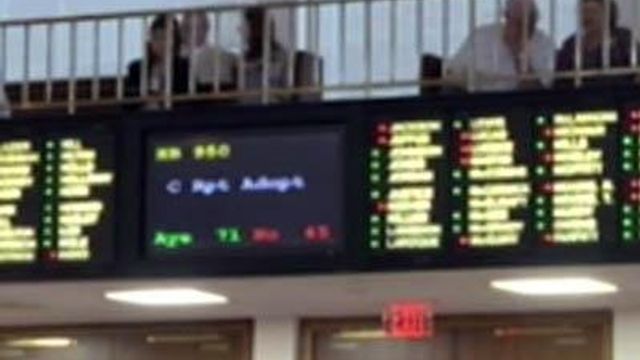Legislature approves compromise budget
The House and Senate on Thursday approved a compromise $20.2 billion state budget, setting up a potential showdown with Gov. Beverly Perdue.
Posted — UpdatedSenators voted 30-15 in favor of the budget for the year starting July 1, which provides a 1.2 percent raise for teachers and state workers and eases the loss of federal stimulus funding to schools but omits compensation for victims of North Carolina's former forced sterilization program.
"The reality is, we have so many dollars to spend, and we have to make decisions based on what money is available," Senate President Pro Tem Phil Berger said. "We don't have the money to do everything."
About a half hour after the Senate vote, the House passed the budget by a 71-45 vote.
Perdue now has 10 days to decide whether to veto the measure or let it become law. She vetoed the two-year budget last year, but the veto was overridden.
"The budget passed today does not go far enough in restoring funding for public schools in North Carolina," she said in a statement Thursday evening. "I will continue to review the proposal, but it is my sincere hope that the General Assembly will find a way to do better in the days ahead.”
The compromise budget spends hundreds of millions of dollars less than what Perdue proposed in her spending plan. She wanted a temporary sales tax increase to restore education cuts, but Republican legislative leaders refused to include new taxes in their plan.
Senate Democrats criticized the budget for not providing more money for education. Sen. Josh Stein, D-Wake, predicted the loss of hundreds of teaching jobs statewide and said the budget accelerates "a long-term degradation to our competitive system."
Calling Stein's calculations "fuzzy math," Sen. Thom Goolsby, R-New Hanover, said total spending on education in North Carolina has increased in the past two years. He also said Republicans have "done great work with the mess that we were left" by the formerly Democratic-controlled legislature.
Sen. Jerry Tillman, R-Randolph, said fears of massive teacher layoffs were overblown, noting schools remained open and students continued to learn after a round of spending cuts last year. The budget provides raises to teachers without resorting to one-time funds, a tactic that he said Democrats used in previous years to patch budget holes, only to create more budget problems down the line.
"You can make a budget that will look goo and appease a lot of people if you use one-time money," Tillman said, asking Democrats how they would address funding problems if they were able to defeat the Republican plan.
"We wouldn't give a tax credit to the wealthy to fire lots of teachers," Sen. Doug Berger, D-Franklin, responded, noting that eliminating a tax break for large businesses could generate $141 million for education.
Sen. Floyd McKissick, D-Durham, said he was concerned that the budget "kills and eliminates our job-creation capacity" by cutting funds to economic development programs like the North Carolina Rural Center and the Golden LEAF development foundation. He also regretted that the Senate didn't join the House in supporting compensation for eugenics victims.
The House had included $11 million to pay $50,000 lump-sum payments to any living victim of the sterilization program, which ran from the 1930s to the mid-1970s. So far, 146 living victims have been verified.
The lack of money for eugenics payments also was a point of contention for House Democrats, who said Republican leaders caved to their Senate counterparts and didn't fight hard enough to keep the money in the budget.
“You’ve just gone ahead and let the Senate roll you,” said Rep. Deborah Ross, D-Wake.
Rep. Rick Glazier, D-Cumberland, said the compromise budget "makes a mockery of this state's historic commitment to education."
Republicans countered that North Carolina residents are still dealing with a sluggish economy and cannot afford to follow the call of Perdue and Democrats in the General Assembly to raise the sales tax to generate more money for schools.
"Budgeting conservatively is the right approach. Avoiding raising taxes at this point in the economy is imperative," said Rep. Nelson Dollar, R-Wake.
Other provisions of the budget include a one-year cap on the state gas tax, a $100 million reserve for the cash-strapped Medicaid fund, tolls on coastal ferries and money to study how to regulate natural gas drilling in North Carolina.
The spending plan met with mixed reviews outside the General Assembly.
State NAACP President Rev. William Barber said the budget is an example of "regressive tax policies" and accused lawmakers of "marginalizing" public education andl pursuing policies harmful to the environment.
"Their actions are mean-spirited towards the poor and the working class, racist and racially disparate toward African-Americans and minorities and intentionally harmful to progress," Barber said at a news conference.
University of North Carolina President Tom Ross said it appears that lawmakers did the best they could in a rough budget year.
“We understand that resources are scarce in every part of state government and believe the legislature worked hard to address our most significant needs and assist us in protecting the quality of education we deliver to our students," Ross said in a statement. "This budget provides some funding for enrollment growth, provides operating reserves for new buildings and begins to restore earlier reductions in financial aid for North Carolina students.”
Bill Harrison, chairman of the State Board of Education, called the budget disappointing, saying it will harm schools and the state's long-term economic success.
"Lawmakers have clearly chosen to put politics before the needs of students, and in making that choice, they have let all of North Carolina down," Harrison wrote in his blog.
• Credits
Copyright 2024 by WRAL.com and the Associated Press. All rights reserved. This material may not be published, broadcast, rewritten or redistributed.






